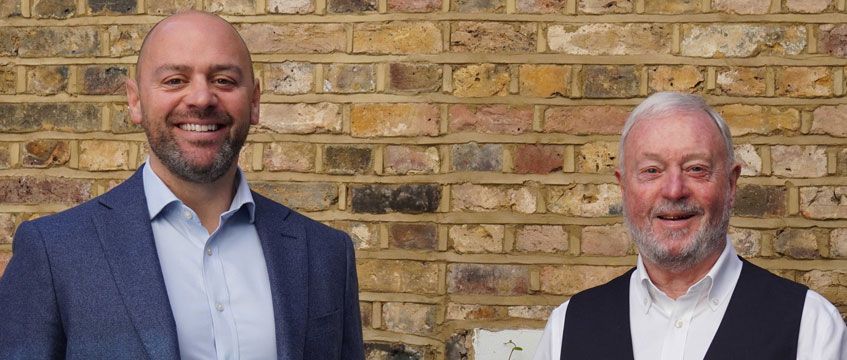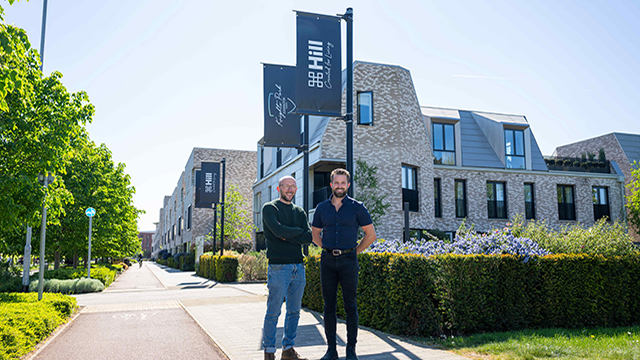When David Tuffin struck out on his own and set up a surveying practice above a fishing tackle shop with two colleagues and a filing cabinet 50 years ago, he didn’t have ambitions of scale. “We never set out to be big,” he says, sitting next to the firm’s current chief executive, Alistair Allison, in Tuffin Ferraby Taylor’s Chancery Lane office. “We just set out to be good.”
Five decades on, TFT employs 177 people across 11 offices, four of which have opened in the past 12 months, and turned over £22m in the last financial year. In December 2022, the surveyor achieved B Corp certification, largely as a result of maximising the performance and sustainability of buildings by focusing on reducing the risks of embodied and operational carbon. This month, the business marked its 50th anniversary by handing over ownership to its staff after 19 years as an LLP.
Now an employee-owned trust, TFT’s corporate restructure comes with a commitment not just to share ownership and benefit with the TFT team but also to “deliver on the firm’s values without external conflict or compromise”. Those values, says Allison will build on the company’s growing reputation as a resilience and sustainability specialist. As the real estate sector grapples with net-zero carbon, TFT has positioned itself as a go-to for guidance rooted in research and statistics. “We have diversified over the years, but we are still building surveyors at heart,” says Allison. “So, we take a qualitative approach to really getting under the skin of a building, understanding what’s there and working out strategies to decarbonise it.”
In the wake of the restructure, Allison (pictured left) and Tuffin join forces to discuss how looking back can be the key to looking forward, especially when it comes to retrofitting and refurbishment, and reveal why TFT will “embrace innovation when it is prudent, but is not particularly good at being a guinea pig”.
One step back
Tuffin stepped back from the day-to-day running of TFT in 2009, honouring one of the rules of the company foundations that everyone retire at 60 to give other people with fresh ideas a chance to take the reins. He has remained connected to the business as a consultant and now, at a time when retrofit and refurb are front and centre, his back catalogue of knowledge has never been more valuable.
“I don’t do anything dramatically technical any more so I can’t be sued,” he says with a hint of a smile. “But when people are dealing with old buildings and they come across something and say ‘I’ve never seen one of those before’, they come to me. Because I’ve most likely seen it. For example, if they find a complicated Victorian plumbing installation on the roof somewhere, I’ve still got the 1921 model bylaws for water companies. I love all of that stuff and I have filing cabinets at home full of that sort of information.”
And there is value in looking backwards, says Allison. “Everyone now is looking back at asset enhancement and refurbishment and for that, you need David’s old books,” he says. “You need them because we are looking at working with assets that have been standing for ages and we now need to do something with them. Modern methods of construction are great and can be efficient. But when you are working with a load of buildings that were built with a lifespan in mind and don’t lend themselves to refurb or retrofit, then tried and tested construction methods to overcome that issue can be very effective and those old books are still extremely relevant.”
Innovative in approach
Part of TFT’s success in the decarbonisation field has come from this willingness to look back as well as forward to find the best solution. The team is, and always has been, very open about its positive but reserved approach to innovation. Speaking to EG in 2019, Allison said: “I think we are early adopters or even sheep when it comes to business tech, rather than really driving it forward.”
And his thoughts today? “I wouldn’t say we are behind the curve,” says Allison. “But sometimes using modern construction methods like off-site just won’t work for an old building.” You have to be open, he says, to options beyond employing modern technology to fix a problem. And if that means looking back at Tuffin’s volumes of Mitchell’s Building Construction and Drawing, then so be it.
In many ways, it has been this measured approach to future-proofing that has, some might say ironically, led to TFT becoming known as something of a pioneer when it comes to the decarbonisation of the built world.
Would Allison refer to the business as it stands in those terms? As a pioneer? “We are innovators in the way we operate within the practice,” he concludes. “What we are doing in the decarbonisation space is huge because we are not just saying we are a specialist in decarbonisation sustainability services, we are taking those specialist skills – and we have about 30 people in that team now – and we are making sure they permeate the whole business. We want every other service to be better off because of what those guys are doing.
“So, we are not just saying we have a team of specialists we can roll out. We are saying to clients that those specialists are informing our whole business. So, when you get a building survey or when you have someone project managing something for you, they will be better informed, more knowledgeable and more aware of what they need to do to help decarbonise the asset. It is not just a siloed service line. So we are very innovative in our approach.”
That approach, adds Tuffin, is based on the company’s age-old strategy of never overpromising. “Anybody can wave a flag and say they are tremendous at decarbonisation and sustainability,” he says. “But you’ve got to be able to back it up. We got the right people and experts in before we went out to clients and then, once we had the expertise, we started to cautiously tell people about the service. Everyone wants to be the best. But you can only be the best if you are absolutely sure no one else can call you out on anything. There is so much greenwashing and virtue signalling out there and it really makes my toes curl.”
Future-proofed
As TFT looks ahead to a new year and a new structure, the business’s focus on decarbonisation will remain front and centre. A new role – that of chief knowledge and ESG officer – has been created to ensure that the business remains firmly focused on the area of expertise for which it has become so well known, and will be taken up by the group’s head of sustainability and ESG, Mat Lown.
“We will continue to invest in long-term progress, resilience and sustainability,” says Allison.
But he is quick to add that the move to becoming an EOT will ensure that as the needs of the industry shift, TFT will be in a prime position to move in sync without the shackles of operating as an LLP. “In recent years, we have innovated our services and broadened our expertise to accelerate decarbonisation,” he says. “The challenges over the next 10 years are less clear but our team’s ideas and skills will be essential to meet them.” The EOT structure, he adds, will be crucial to a smooth, agile path forward.
The restructure has been a long time coming, he adds. “Businesses do it for different reasons but for us it is about succession and making sure we are TFT forever.”
“It’s a great thing from my viewpoint,” adds Tuffin. “When I left, people asked me why I didn’t sell the business. It’s never been about that: putting your money in, growing fast then selling. Surveying shouldn’t be about that in my opinion. As I said, when I first started the company, I didn’t set out to be big. I set out to be good. And to leave a legacy.”
To send feedback, e-mail emily.wright@eg.co.uk or tweet @EmilyW_9 or @EGPropertyNews











